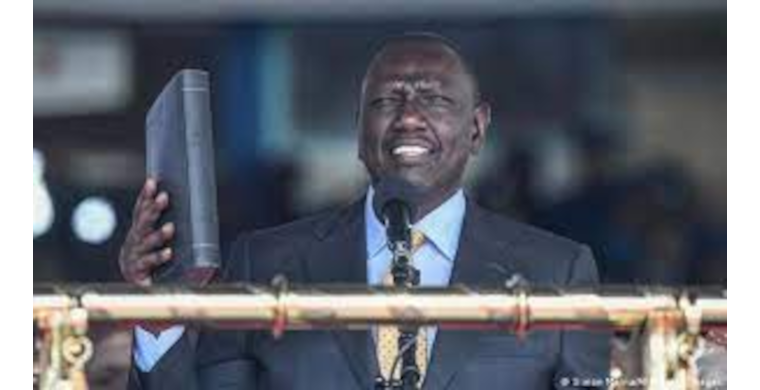NEW PRESIDENT OF KENYA IS A STAUNCH CHRISTIAN
He drew support from Anglican Archbishop Jackson Ole Sapit who called for peace
By Godfrey Olukya
VOL African correspondent
www.virtueonline.org
Sept. 20, 2022
Kenya's new president is a staunch Christian - He has vowed to collaborate with all faith communities in the region.
''If it was not for God being with us in whatever we were doing we could not have won the presidential election," said the new president of Kenya Dr. William Ruto at a swearing in ceremony in the country's capital Nairobi.
William Ruto, is the country's first evangelical Christian president and he vowed to put religion center-stage while in office after it played a key role in his election victory.
One of his supporters, James Kyesang said, "Ruto is proud of his religion and he often professes his faith in public. In all his speeches he praises God for being at his side at all times. He is also good at quoting the holy Bible in his public speeches.
It is probably because of his deep religious faith that he has vowed to enhance collaboration with the East African nation's faith communities.
According to the Living Church magazine Ruto said, "I commend the Church in particular, and in equal measure the Islamic religious leadership, for their considerable support to us and our campaign," Ruto said during his inauguration on September 13. "We also appreciate them for continuously exploring avenues for interfaith understanding and solidarity, which have gone a long way to enhance tolerance and cohesion in Kenya."
Kenya's August 9 election was the latest face-off between the country's major political factions. Past disputes, which initially focused on land rights, gave rise to prolonged ethnic conflict. In violence that followed the 2007-08 election cycle, an estimated 1,000 people were maimed, raped, or killed, and more than 500,000 displaced.
As an evangelical Christian, Ruto supported what he calls "bottom-up economics," beating longtime opposition leader Raila Odinga, a member of All Saints Anglican Cathedral in Nairobi, who favored a reformed welfare state.
In a unanimous ruling on September 5, the country's Supreme Court confirmed Ruto's 50.49 percent win over Odinga's 48.85 percent.
Odinga had the backing of former President Uhuru Kenyatta, his opponent in the nation's last two contests, in a striking reversal of loyalties among Kenya's historic political elite. Kenyatta is a son of Kenya's founding President Mzee Jomo Kenyatta, who favored the global West, and served from 1964 until his death in 1978. Jomo Kenyatta fell out with Odinga's father, founding Vice President Jaramogi Oginga Odinga, who supported strengthened relations with Communist China and the Soviet Union.
The election was also seen by some as a referendum on Kenya's reforming constitution, which was approved by wide margins in an August 2010 referendum. The constitution, which seeks to overcome ethnic rivalry by spreading power and resources to 47 counties, also includes significant anti-corruption measures and human-rights protections that have been praised by activists around the world.
Odinga, who championed the reforms, wanted Kenya's American-style presidency reviewed to provide more centers of power in the executive branch for representatives from different ethnic groups, whose strained relations are a continual challenge.
Kenya's first four presidents have been drawn from the dominant Kikuyu and Kalenjin tribes. Odinga has often identified himself as both ethnically Luo and Luhya, from Western Kenya, while Ruto is Kalenjin, from the Northwest.
The proposed changes were criticized by Ruto, who claims the country's economic situation is more urgent. Ruto led evangelicals in opposing the 2010 reforms, claiming in part that they were extremely liberal.
Odinga, who has not conceded defeat, issued a statement on September 12, saying Kenya's electoral body "did not conduct a fair and free election," and that the Supreme Court's ruling "was not based on facts and the law."
"This is the moment Kenya has been waiting for," Archbishop of Kenya Jackson Ole Sapit said before the election results were revealed at the National Tallying Center in Nairobi. "The nation has been anxious, but we want to urge all Kenyans: let us put our anxieties aside. The Bible says the end of a matter is better than the beginning. We want to urge the country to remain united. We have families to look after. An economy to grow. Children who will go back to school. We want our nation back."
The Archbishop of Canterbury, Justin Welby, weighed in the same evening: "I applaud and support Archbishop Jackson Ole Sapit of the Anglican Church of Kenya in calling for peace, prayer for Kenya, and only constitutional forms of dissent. Kenya is a strong democracy -- may all her people flourish in peace, and may God bless all those working for that peace."
Archbishop Sapit who has avoided commenting on Kenya's electoral situation since then, joined other clergy on August 20 for what he called a pastoral visit to Odinga, and affirmed that the losing politician and his family are Anglicans.
More than 85 percent of Kenya's 55 million people are Christians, while Muslims account for about 11 percent. The Anglican Church of Kenya (ACK) is the third-largest Anglican church in Africa, behind Nigeria and Uganda. The Anglican Church of Kenya's reported membership of 5 million is nearly three times the reported membership of the United States-based Episcopal Church.














